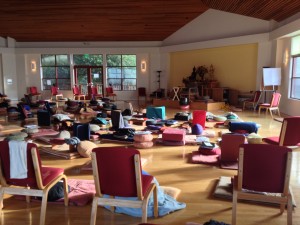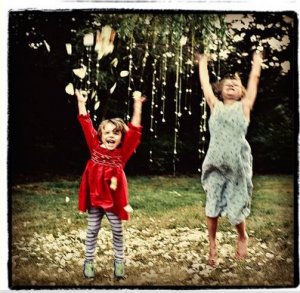Gladdening the Mind
 I’m back now from the 10-day Concentration Retreat at Spirit Rock (which was difficult and wonderful) and which has left me with a deep sense of gratitude for the Buddha’s teachings and a profound sense of respect — and love — for the teachers (especially Phillip Moffitt) whose kindness and generosity, not to mention wisdom, patience and good humor, was a gift beyond compare.
I’m back now from the 10-day Concentration Retreat at Spirit Rock (which was difficult and wonderful) and which has left me with a deep sense of gratitude for the Buddha’s teachings and a profound sense of respect — and love — for the teachers (especially Phillip Moffitt) whose kindness and generosity, not to mention wisdom, patience and good humor, was a gift beyond compare.
The talks from the retreat are available on DharmaSeed. (Click here.) They’re all wonderful, but for something really special, listen to Phillip’s talk on The Variety of Samahdi Experience, which includes a 10-minute guided meditation on Gladdening the Mind (beginning at about 55 minutes into the talk).
Enjoy.
Before the Ecstasy…
 I’m leaving early tomorrow morning to attend a 10-day Concentration Retreat at Spirit Rock, which I am very much looking forward to, but right now, it’s the laundry (and the packing and all the other getting-ready activities) that I’m focusing on right now.
I’m leaving early tomorrow morning to attend a 10-day Concentration Retreat at Spirit Rock, which I am very much looking forward to, but right now, it’s the laundry (and the packing and all the other getting-ready activities) that I’m focusing on right now.
I won’t be posting again until I return, so check back again sometime after Aug. 26.
In the mean time, I leave you with this quote from the Dhammapada, by Joseph Goldstein, from his book Mindfulness: A Practical Guide to Awakening.
“About this mind…in truth it isn’t really anything. It’s just a phenomenon. Within itself it’s already peaceful. That the mind is not peaceful these days is because it follows moods….
“Sense impressions come and trick it into happiness, suffering, gladness and sorrow, but the mind’s true nature is none of those things. That gladness or sadness is not the mind, but only a mode coming to decide us. The untrained mind gets lost and follows these things, it forgets itself, then we think that it is we who are upset or at ease or whatever. But really this mind of ours is already unmoving and peaceful…
“Our practice is simply to see the Original Mind. So we must train the mind to know those sense impressions, and not get lost in them. To make it peaceful. Just this is the aim of all this difficult practice we put ourselves through.”
Five Animal Sangha
 When I first got to Chapel Hill, I tried to find a meditation group to practice with while I was here for the summer, but I never quite found what I was looking for. So I thought: well, that’s OK, I’ll be home in a few months, and anyway, I still have my KM group that Skypes me every-other week.
When I first got to Chapel Hill, I tried to find a meditation group to practice with while I was here for the summer, but I never quite found what I was looking for. So I thought: well, that’s OK, I’ll be home in a few months, and anyway, I still have my KM group that Skypes me every-other week.
But now that it’s about time for me to leave, I realize that I HAVE found a sangha here. Not just the kind I thought I was looking for.
It’s a lovely little qigong class I stumbled upon, led by exactly the kind of light-hearted, but also deeply trained teacher I had hoped to find. And the group itself is full of interesting people — one is an acupuncturist, another a puppeteer — who are friendly and kind and who are serious about enjoying their practice. (The teacher is Jay Dunbar and his school is called Magic Tortoise.)
The teacher and the people are great…and the qigong practice is pretty cool too! It’s called Five Animal Frolic (medical qigong) and it’s a series of movements based on the Crane, the Bear, the Monkey, the Deer and the Tiger.
The Bear is my favorite.
According to the classic texts: The bear appears ponderous and solid on the outside, but is alert and spirited within. Its powerful waist and legs shake, its paws are awesomely strong. Its energy is concentrated in its center.
Jay Dunbar adds: The spirit of the bear is mighty, indomitable, energetic. It is brave, without rival. The bear’s tireless power comes from the relaxed and easy use of its strength, from a balance of rest and activity, and from curving, twisting motion.
Obstacles
 Last night was Jack Kornfield‘s last night to lead the Monday Night Group at Spirit Rock before leaving for a year-long sabbatical. The talk he gave included a lovely dialogue with poet Alison Luterman, in which poetry and personal stories set the stage for Jack to embark on what he said would be a year for him to try out new, creative endeavors. But don’t worry — he’ll be back for the opening of the new Community Meditation Hall next year.
Last night was Jack Kornfield‘s last night to lead the Monday Night Group at Spirit Rock before leaving for a year-long sabbatical. The talk he gave included a lovely dialogue with poet Alison Luterman, in which poetry and personal stories set the stage for Jack to embark on what he said would be a year for him to try out new, creative endeavors. But don’t worry — he’ll be back for the opening of the new Community Meditation Hall next year.
You can listen to the talk here. Here’s one of the poems:
Because Even the Word Obstacle is an Obstacle,
by Alison Luterman
Try to love everything that gets in your way:
the Chinese women in flowered bathing caps
murmuring together in Mandarin, doing leg exercises in your lane
while you execute thirty-six furious laps,
one for every item on your to-do list.
The heavy-bellied man who goes thrashing through the water
like a horse with a harpoon stuck in its side,
whose breathless tsunamis rock you from your course.
Teachers all. Learn to be small
and swim through obstacles like a minnow
without grudges or memory. Dart
toward your goal, sperm to egg. Thinking Obstacle
is another obstacle. Try to love the teenage girl
idly lounging against the ladder, showing off her new tattoo:
“Cette vie est la mienne,” This life in mine,
in thick blue-black letters on her ivory instep.
Be glad she’ll have that to look at all her life,
and keep going, keep going. Swim by an uncle
in the lane next to yours who is teaching his nephew
how to hold his breath underwater,
even though kids aren’t allowed at this hour. Someday,
years from now, this boy
who is kicking and flailing in the exact place
you want to touch and turn,
will be a young man, at a wedding on a boat
raising his champagne glass in a toast
when a huge wave hits, washing everyone overboard.
He’ll come up coughing and spitting like he is now,
but he’ll come up like a cork,
alive. So your moment
of impatience must bow in service to a larger story,
because if something is in your way it is
going your way, the way
of all beings; toward darkness, towards light.
The Secret Method
 Apparently last night’s Full Moon was especially big and bright. Unfortunately it was raining here in Chapel Hill, so I didn’t get to see it. Which was OK, because I knew it was there, just hidden. So I celebrated the Dark Full Moon by listening to several wonderful talks given by Akincano Marc Weber, currently at the Forest Refuge in Barre, MA.
Apparently last night’s Full Moon was especially big and bright. Unfortunately it was raining here in Chapel Hill, so I didn’t get to see it. Which was OK, because I knew it was there, just hidden. So I celebrated the Dark Full Moon by listening to several wonderful talks given by Akincano Marc Weber, currently at the Forest Refuge in Barre, MA.
All the talks were great, but the one I remember most is the one where he starts out: “Meditation is more than technique or method. There is no technique or method that is going to take you all the way. As indispensable and as powerful as techniques and methods are, no technique or method is going to make the mind free.”
And then he quotes cryptography and security expert Bruce Schneider (who he says is considered a “god” in his field): “If you believe technology is going to solve your problems, you do not understand your technology. And worse, you do not understand your problems.”
As someone who has a tendency to want to do things the “right” way, I found this talk to be quite liberating. You can listen to it here.
Read, Reflect, Respond, Rest. Then Review.
 I got an email from Thanissara, in which she welcomes everyone who is taking the Dharmagiri On-line Study-Practice Course and suggests that we all begin by becoming familiar with a method of Contemplative Reading, called Lectio Divina, taken from the Christian tradition.
I got an email from Thanissara, in which she welcomes everyone who is taking the Dharmagiri On-line Study-Practice Course and suggests that we all begin by becoming familiar with a method of Contemplative Reading, called Lectio Divina, taken from the Christian tradition.
The method involves 4 separate readings of the text in question. (In the first lesson of the course, we are asked to read/contemplate the Simile of the Mountain, SN 3:25; I 100-102.)
Here’s how the practice is done:
(1) After the first reading, ask yourself this question: What word or phrase strikes me now? Write it down. Now look at what you’ve written and notice any thoughts, memories,emotions, etc. that arise.
(2) After the second reading, complete this sentence: This passage invites me to… Now look at what you’ve written and, again, notice any feelings, doubts, opinions, etc.
(3) After the third reading, complete this sentence: As a result of this reading, I am going to…. Look at what you’ve written and ask Can I do this? Do I really want to do this? Is is realistic? Notice how you feel.
(4) After the fourth reading,…Rest. Let the words settle and if it feels right, end the session with a bow or chant.
Before reading/contemplating the next text, Review the entry from the session before and see if you can notice any effect this has had in your life.
May All Beings Be Free
 I’ve been learning one of the Metta chants (the one that starts “imaya dhammanu“), which I love to sing in Pail, but I also read it aloud in English. Because it’s just so LOVEly!
I’ve been learning one of the Metta chants (the one that starts “imaya dhammanu“), which I love to sing in Pail, but I also read it aloud in English. Because it’s just so LOVEly!
By this practice, in accord with the Dharma, I honor the Buddha.
By this practice, in accord with the Dharma, I honor the Dharma.
By this practice, in accord with the Dharma, I honor the Sangha.
May I be free from animosity, free from oppression, free from trouble, may I know the grace of well-being.
May my parents, teachers, family, friends, and fellow dharma-travelers
All be free from animosity, free from oppression, free from trouble, and know the grace of well-being.
May all the practitioners in this place
All be free from animosity, free from oppression, free from trouble, and know the grace of well-being.
May our guardian spirits, in this temple,
In this dwelling, in this place; may the guardian spirits
All be free from animosity, free from oppression, free from trouble, and know the grace of well-being.
May all beings, all living beings, all creatures,
All individuals, all personalities,
All woman and female beings, all men and male beings, all noble ones, all wordily ones,
All spirits and gods, all humans and all those in misery,
All be free from animosity, free from oppression, free from trouble, and know the grace of well-being.
May all beings be free from suffering, enjoy safety and abundance, owners of their karma.
We offer the merit of our practice to all beings.
Sadha, sadhu, sadhu.
Peachy!
 Check out this August menus from the Garrison Institute Kitchen:
Check out this August menus from the Garrison Institute Kitchen:
Corn Chowder
Tomato Salad with Marjoram
Sautéed Chard with Mozzarella and Tarragon dressed with Sorrel Vinaigrette
Oven-Poached Peaches with Rose’ Wine and Spices
(You can see why I love to go there!)
Here’s the recipe for the Oven-Poached Peaches:
2 cups water
1 cup raw sugar or maple syrup
Optional flavorings: lemon zest, vanilla bean, cinnamon stick, bay leaf, black peppercorns, cardamon pods, mace
4 ripe peaches
2 cups rose’ wine
Preheat oven to 350F. In a small saucepan over medium heat, melt the sugar in the water until dissolved. Add any of the optional flavorings. Turn off the heat and set aside to steep.
Peel the peaches and cut in half. Place the halves in a baking dish cut-side down and pour the sugar-water and wine over the top. Be sure any spices are scattered around the pan. Bake 5 minutes, baste, and bake another 12 to 15 minutes, until the peaches are quite soft and brown on top.
Serve the peaches, with the resulting syrup, as they are. Or reduce the syrup in a small saucepan until thickened. Peaches are good either warm or cold.
Serves 6-8
Taking Refuge
 A friend is coming to visit me for a few days, so I won’t be posting again until Wednesday. To carry you over the long weekend, I offer this reflection from Module One, Lesson Two of the excellent online dharma course I wrote about on Monday.
A friend is coming to visit me for a few days, so I won’t be posting again until Wednesday. To carry you over the long weekend, I offer this reflection from Module One, Lesson Two of the excellent online dharma course I wrote about on Monday.
Where do you put your trust?
“The Pail term, saddha, means confidence, supported by understanding, which further deepens faith and trust. Where do we put our trust?
“Notice where the heart goes for comfort and peace. We might notice that we seek refuge in escape, going to sleep and not feeling anything, or we might find a refuge in pleasing distractions. Sometimes we might notice that we have a lot of faith in our thinking mind. For example, we take refuge in trying to figure it all out, or we find solace in negativity or worry.
“We all have faith or trust. The question is whether that faith is misplaced or skillfully placed.”
From that Venerable Sage….
 “Kindness covers all my political beliefs. No need to spell them out. I believe that if at the end, according to our abilities, we have done something to make others a little happier and something to make ourselves a little happier, that is about the best we can do.
“Kindness covers all my political beliefs. No need to spell them out. I believe that if at the end, according to our abilities, we have done something to make others a little happier and something to make ourselves a little happier, that is about the best we can do.
“To make others less happy is a crime. To make ourselves unhappy is where all crime starts. We must try to contribute joy to the world. That is true, no matter what our problems, our health, our circumstances. We must try. I didn’t always know this and I’m happy I lived long enough to find it out.”
— Roger Ebert
